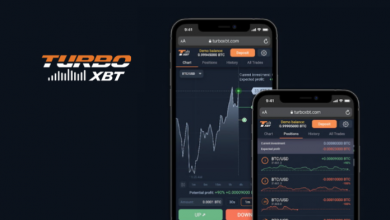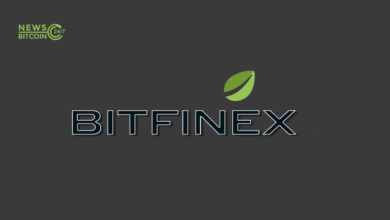The Future of Web3 Careers in 2023 – Embracing Decentralization and Blockchain Technology

Table of Contents
In 2023 and beyond, pursuing opportunities has become an entirely natural and increasingly prevalent endeavor.
Today, individuals are no longer content with enduring mistreatment from employers and are consistently in search of fresh avenues that promise fulfillment.
Consequently, a novel industry has recently materialized, a realm that rejects such mistreatment and offers novel prospects which might appear surreal to those accustomed to a lifetime tethered to a desk under the gaze of a relentless boss from nine to five. This is precisely where the focus shifts to careers in Web3.
In this article, we will explore the heartbeat of the Web3 industry, contemplating its potential as the prospective future for career enthusiasts.
Overview of Web3 and Its Impact on (Traditional) Careers
The roots of Web3 and its impact on careers can be traced back to the origin of blockchain technology, initially associated with cryptocurrencies like Bitcoin. However, only in 2014 Ethereum co-founder Gavin Wood coined the term “Web3” to define a decentralized online ecosystem built on blockchain technology, marking its introduction.
Ethereum‘s launch in 2015 brought the concept of “smart contracts,” enabling the creation of decentralized applications (DApps) and reshaping work dynamics.
Web3’s effect on job roles is tightly meshed with the emergence of tokens and digital assets (much more visible after Ethereum) representing ownership or utility within DApps. This innovation has birthed roles like blockchain developers, smart contract auditors, and token economists.
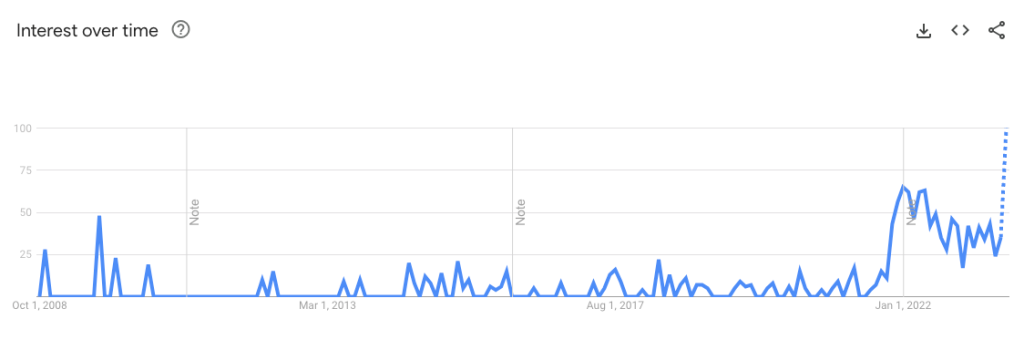
Source: Google Trends
Interest in Web3 has steadily grown since 2021, according to Google Trends. This surge in interest can be attributed to the transformative nature of Web3 jobs, which aligns with the principles governing blockchain technology.
Traditionally structured workplaces, confined to physical offices and fixed schedules, contrast with Web3’s principles. This paradigm shift embraces blockchain governance, reducing constraints like geographical limitations and hierarchical decision-making and fostering opportunities in Web3.
Built on the blockchain, Web3 offers employment avenues that match its principles, breaking geographical barriers and enabling global collaboration. The decentralized nature liberates work from office confines, thriving in an interconnected digital environment.
Consequently, Web3 has evolved into its current state. We’re discussing it if you’re unfamiliar with its present form.
The Current State of the Web3 Job Market
Presently, statistics indicate a significant ongoing enthusiasm for Web3 careers. Specifically, according to the last statistics available related to this subject, in 2021, over 34,000 developers participated in coding for open-source Web3 initiatives, while more than 18,000 developers are presently engaged in active contributions to open-source crypto and Web3 projects.
A strong demand marks the current state of Web3 careers for developers who specialize in creating decentralized applications and utilizing blockchain technology to enhance services.
However, more up-to-date information demonstrates a sustained upward trajectory in the appeal of Web3 job opportunities. As evidenced by this image, just within the past month, there have been more than 12,000 inquiries for the term “web3 jobs.”
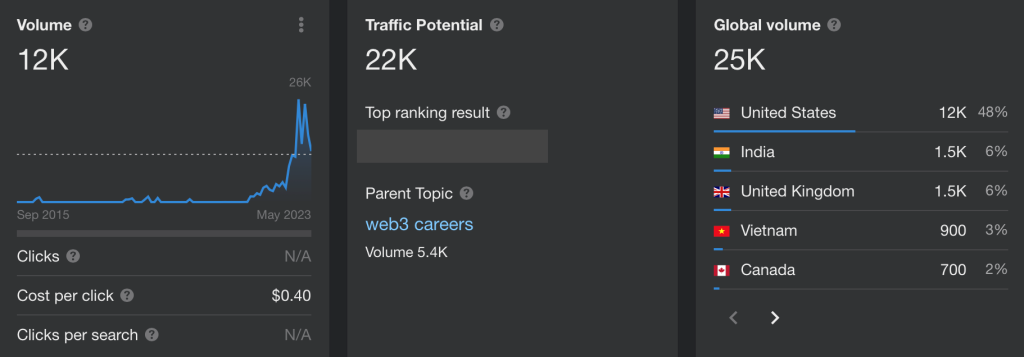
Source: Ahrefs
In tandem with this demand, salaries for Web3 developers are on the rise. Their unique proficiencies in blockchain lead to higher compensation compared to Web2 developers. For instance, the average Web3 developer’s salary is between $125.000 – $200.000 per year, surpassing the average for their Web2 counterparts, according to Web3 Career.
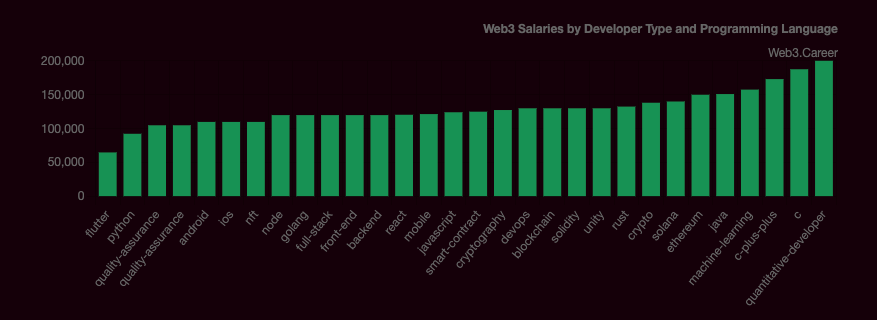
Source: Web3 Career
Furthermore, there’s no need for concern if you’re not in a technical role, as numerous non-technical positions are available. To illustrate, the distribution of technical and non-technical job openings on CryptoJobList, a Web3-focused recruitment platform, can be observed in the provided image.
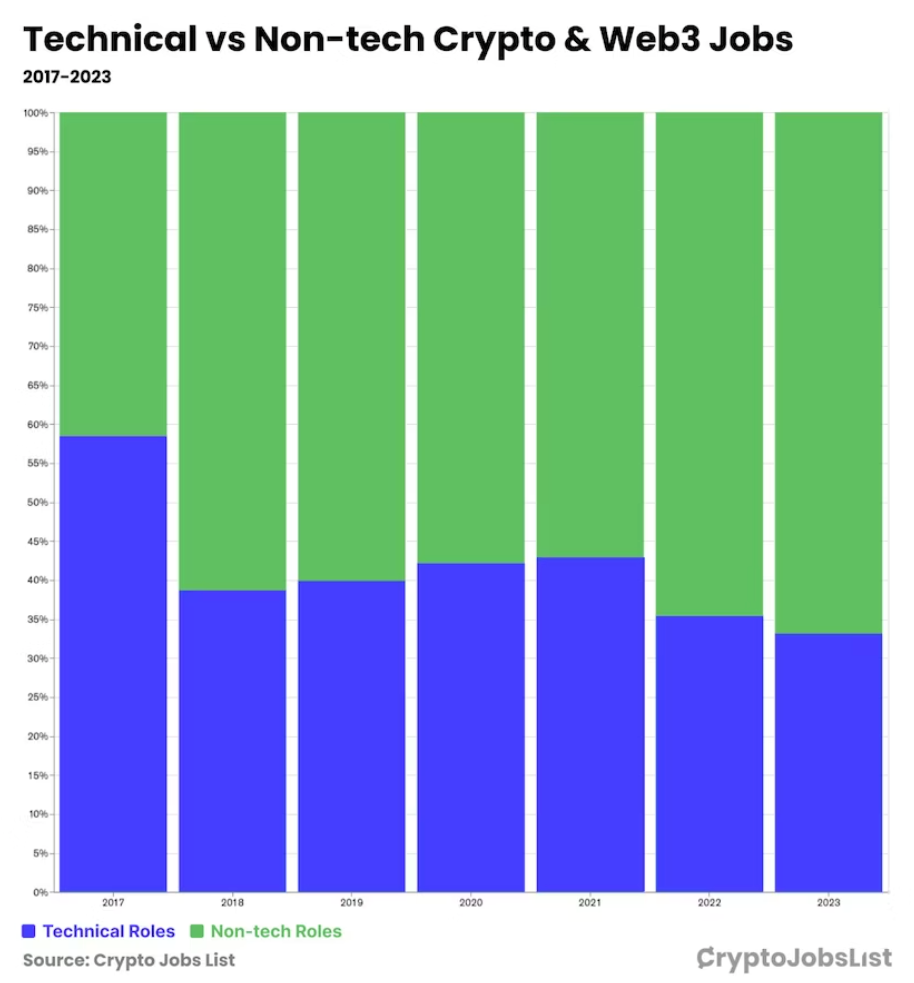
Source: CryptoJobList
Intensified demand for Web3 talent also fosters heightened competition among companies vying for top candidates. Companies need to offer competitive salaries, appealing benefits, and avenues for professional growth to attract the best.
In relation to companies, several major brands are already channeling investments into substantial projects within Web3. Noteworthy names like Nike, Shopify, Alphabet, and Budweiser are involved.
If things keep going as they are now, the rest of 2023 and the years ahead look good for the Web3 job market.
Even though there might be tough times in the market, data shows that there is still interest in this area and that there will continue to be because the Web3 industry is still appealing to skilled individuals.
As the market gets better and more businesses start using blockchain, we can predict that there will be more demand for both technical and non-technical jobs in the Web3.
Popular Web3 Career Paths: Top 5 Web3 Careers
As we discussed the demand earlier, here’s a list of the top 5 Web3 careers, determined by market demand and the potential earnings associated with each role:
1. Blockchain Developer/Engineer
One of the most coveted positions in Web 3.0 is that of a blockchain developer or engineer. This job involves creating, managing, and sometimes designing, analyzing, and implementing blockchain technology applications. Excelling in this role requires robust coding skills, cryptography experience, and familiarity with a specific blockchain platform like Ethereum or Bitcoin.
Starting with a foundation in networking, programming, data structures, and computer science is key. Progressing, you can explore advanced blockchain courses, paving the way for promising global career opportunities. The average annual earnings for a Blockchain Developer or Engineer are $130,000, with a salary range spanning from $60,000 to $250,000.
2. Blockchain Architect
A blockchain architect is a professional who understands the system intricacies of designing while managing potential risks. They formulate solutions, identify infrastructure needs, and establish security measures, translating business requirements into technical blueprints. Strong coding skills are imperative, helping assess idea feasibility. They also play a significant role in evaluating technical excellence and project-level decisions. Keeping up with blockchain trends and understanding concepts like hash functions are vital. Compensation for a blockchain architect averages $140,000 annually, ranging from $60,000 to $300,000.
3. Solidity Developer
Solidity developers craft code using the Solidity programming language, tailored for smart contracts and DApps within the Ethereum ecosystem. High demand arises from their ability to build decentralized applications on the Ethereum blockchain. The typical annual pay for Solidity Developers is approximately $96,300, from $36,000 to $160,000.
4. DeFi Developer/DApp Developer
DeFi developers contribute to decentralized financial systems, building lending platforms, and shaping open finance. To excel as a DApp developer, proficiency in coding languages like Java, JavaScript, or Solidity is crucial. The demand for DApp developers is robust in the Web3 landscape. A DeFi developer earns an average annual income of $126,000, with a salary range from $99,000 to $152,000.
5. UX Developer
Lastly, UX developers craft user-friendly, engaging interfaces for Web3 products. Their core aim is to simplify user tasks, demanding technical prowess and a deep understanding of blockchain technology. Effective communication skills are vital, given their collaboration across divisions. Globally, UX designers earn around $81,834 annually in 2023.
Web3 Career Challenges and Opportunities
Following our exploration of the existing landscape of Web3 careers, and particularly upon witnessing the attractive compensation in these domains, you’re likely brimming with enthusiasm and eagerness to dive into the pursuit of a job within this sector or perhaps embark on a learning journey. However, it’s crucial to recognize that this arena isn’t devoid of obstacles. While it holds remarkable opportunities, it also presents its fair share of challenges:
Challenges
- Technical Complexity – Web3 tech (blockchain, smart contracts) is intricate, demanding a solid technical base and ongoing learning.
- Skill Gap – Shortage of skilled blockchain cryptography experts hampers recruitment.
- Regulatory Uncertainty – Evolving regulations across jurisdictions create complexity.
- Security Concerns – Vulnerabilities in Web3 systems require robust security measures.
- Adoption Hurdles – Encouraging Web3 adoption faces resistance due to unfamiliarity.
Opportunities
- High Demand – Web3 professionals (developers, designers) are in high demand.
- Innovation – Web3 drives innovation across sectors like healthcare and supply chain.
- New Business Models – Tokenization, NFTs, and DAOs enable novel business models.
- Industry Disruption – Web3 disrupts sectors like banking and gaming, offering transformation opportunities.
- Learning and Growth – Web3’s dynamic nature ensures ongoing learning and skill development.
By weighing these challenges against the opportunities, you’ll be equipped to determine whether a career in Web3 aligns with your aspirations. If you find it a suitable fit, take decisive action and begin searching for a fitting position on one of the best Web3 job lists available.
Final Thoughts
With a comprehensive exploration encompassing the essence of Web3 and its transformative influence on conventional careers, along with an in-depth examination of the existing landscape of Web3 career prospects and insights into the earning potential of industry experts, the stage is set for a significant decision.
Amidst this modern-day gold rush, prudence ensures your entrance into the Web3 job listings isn’t a leap into the unknown. Selecting a career that provides financial stability and resonates with your passions is vital.

